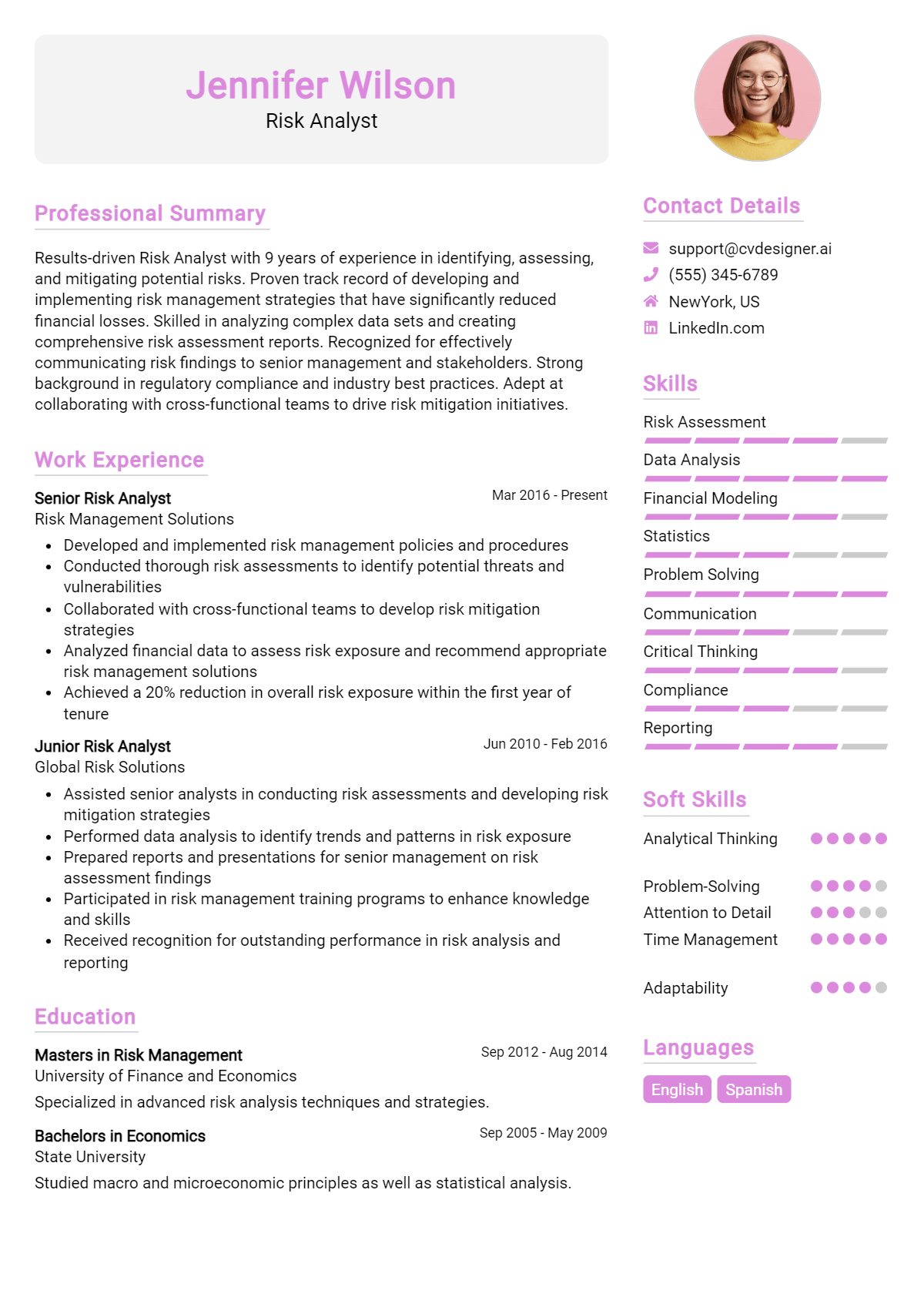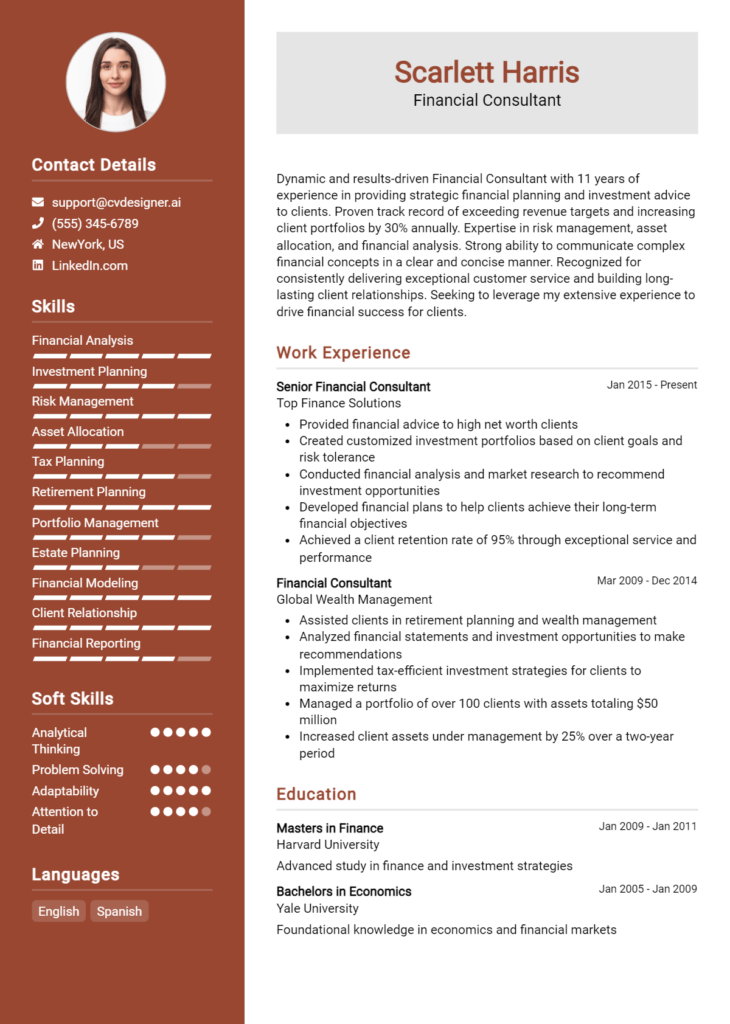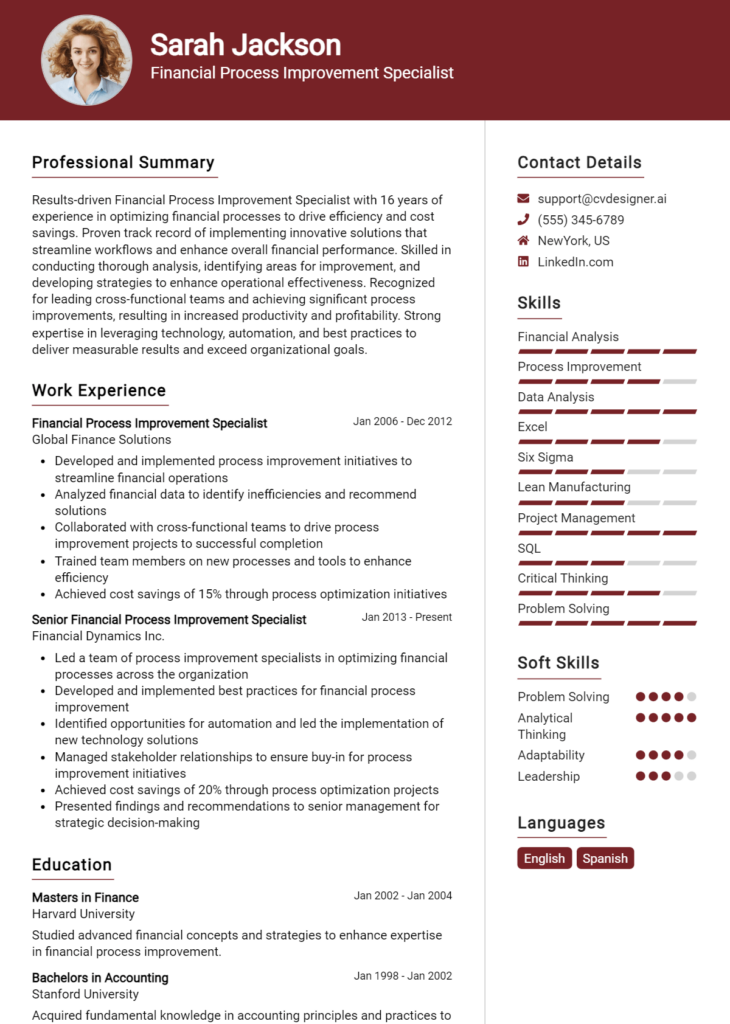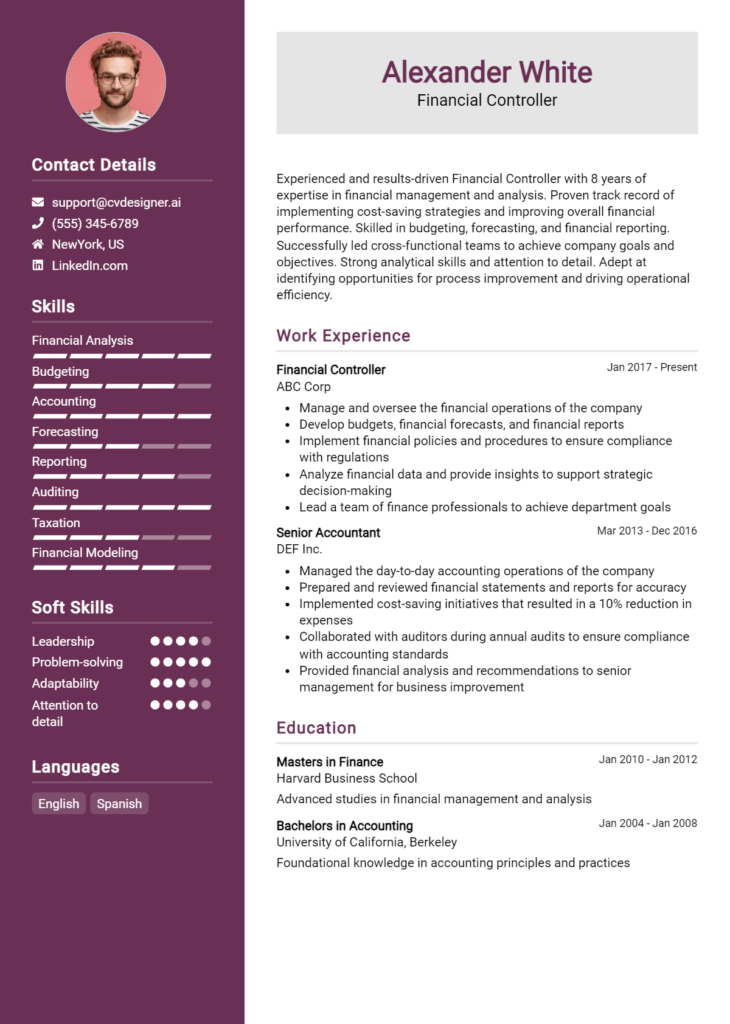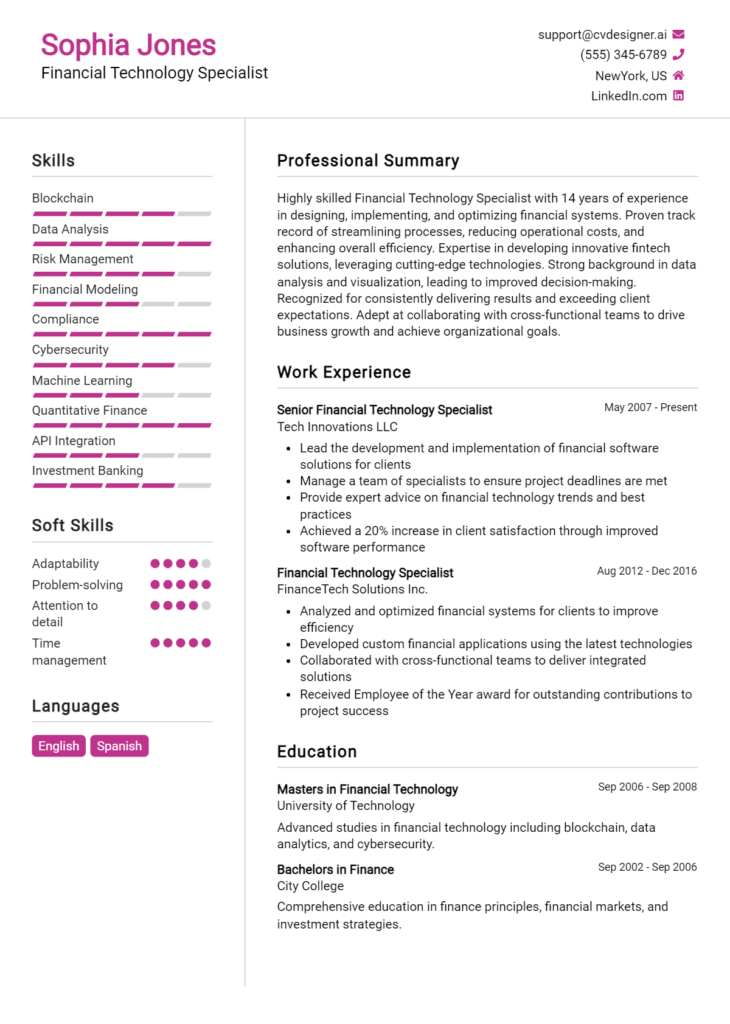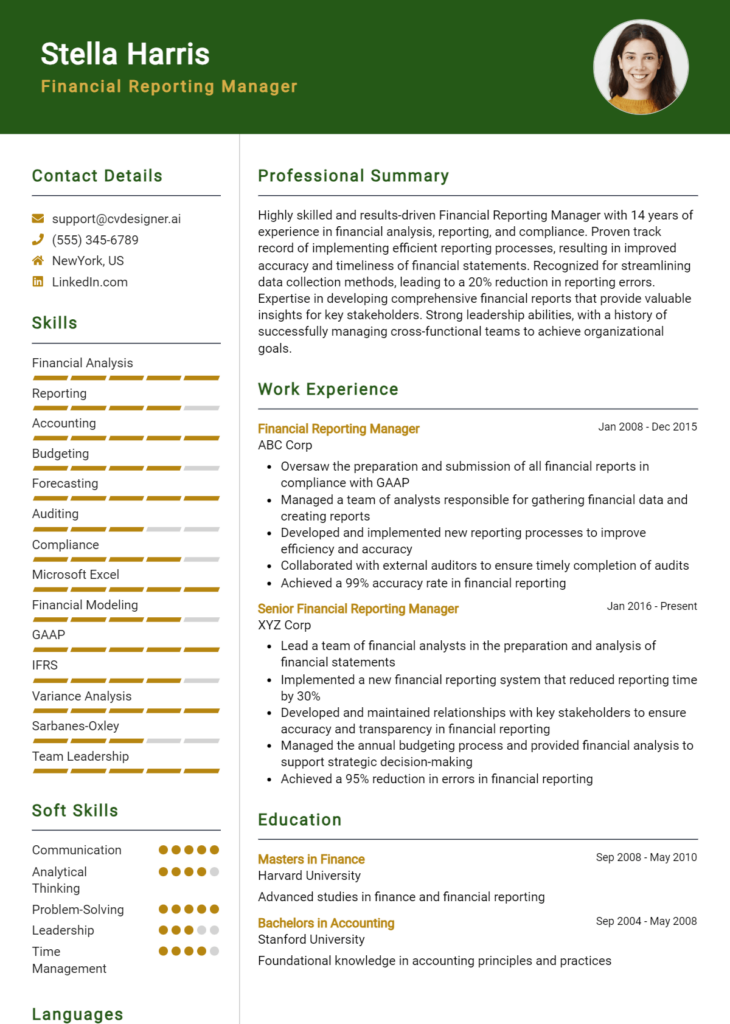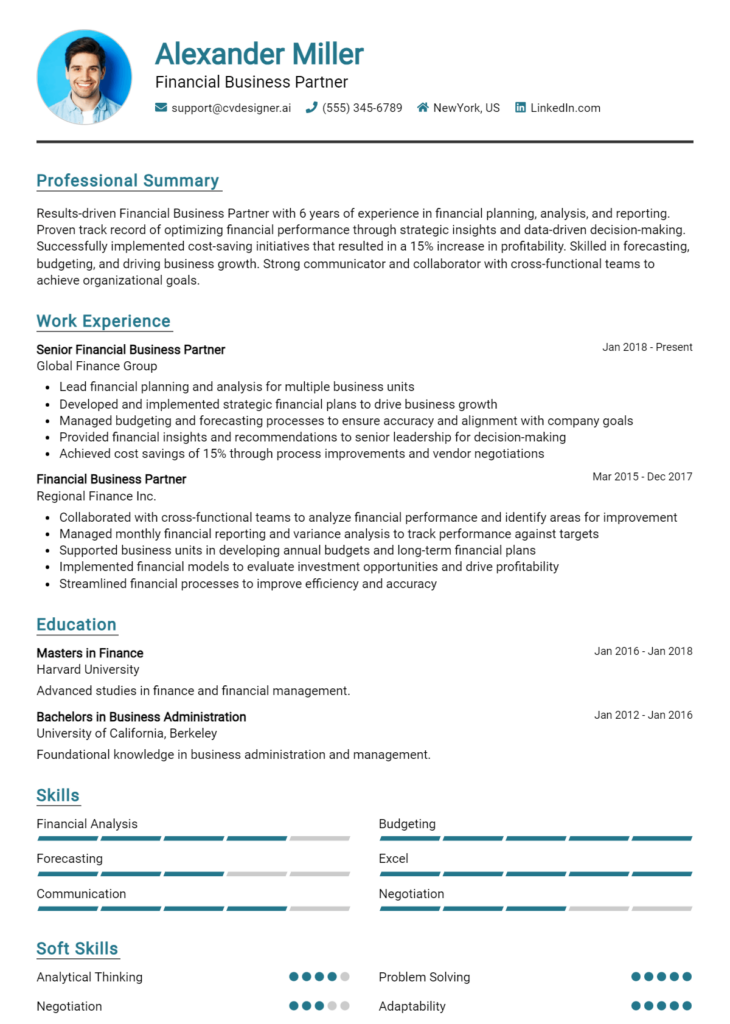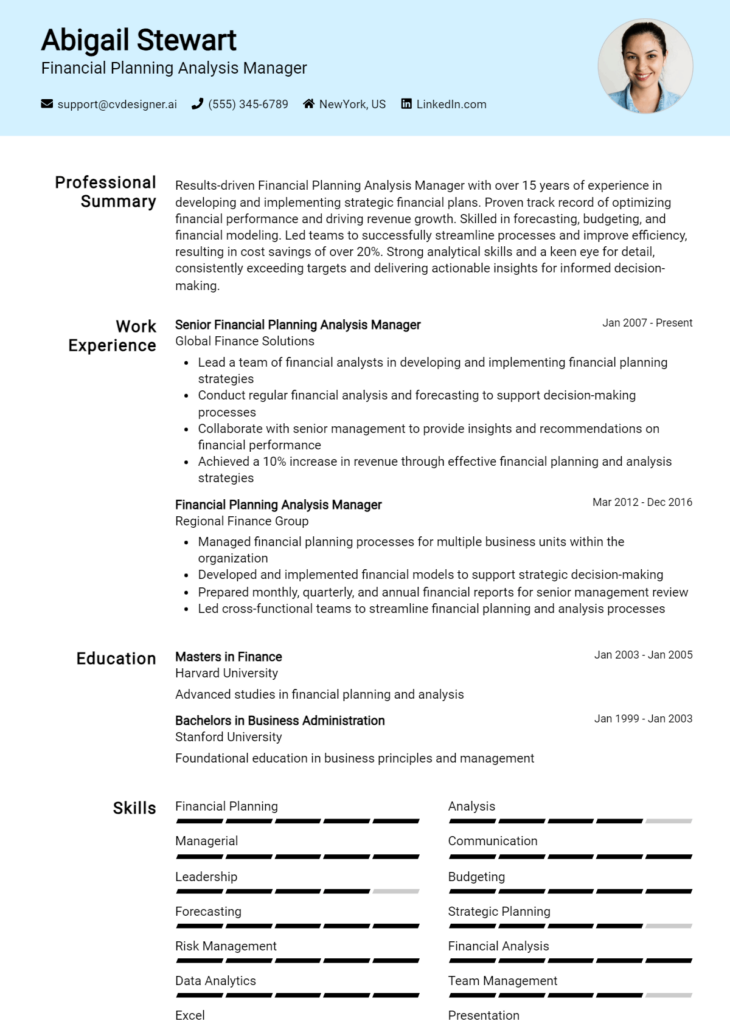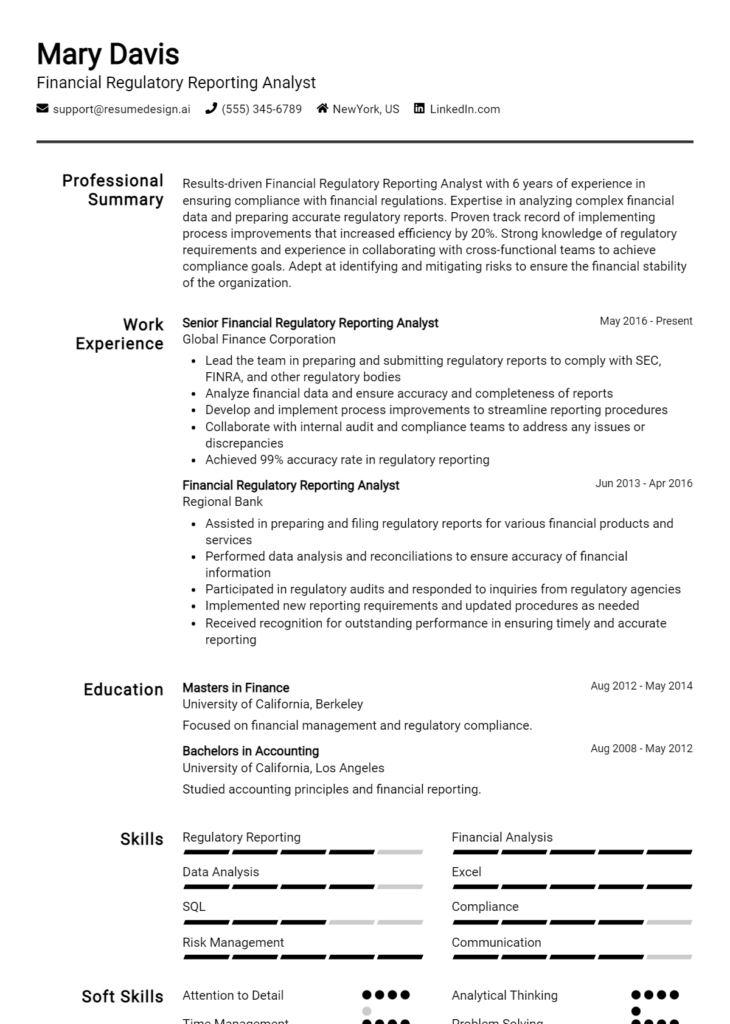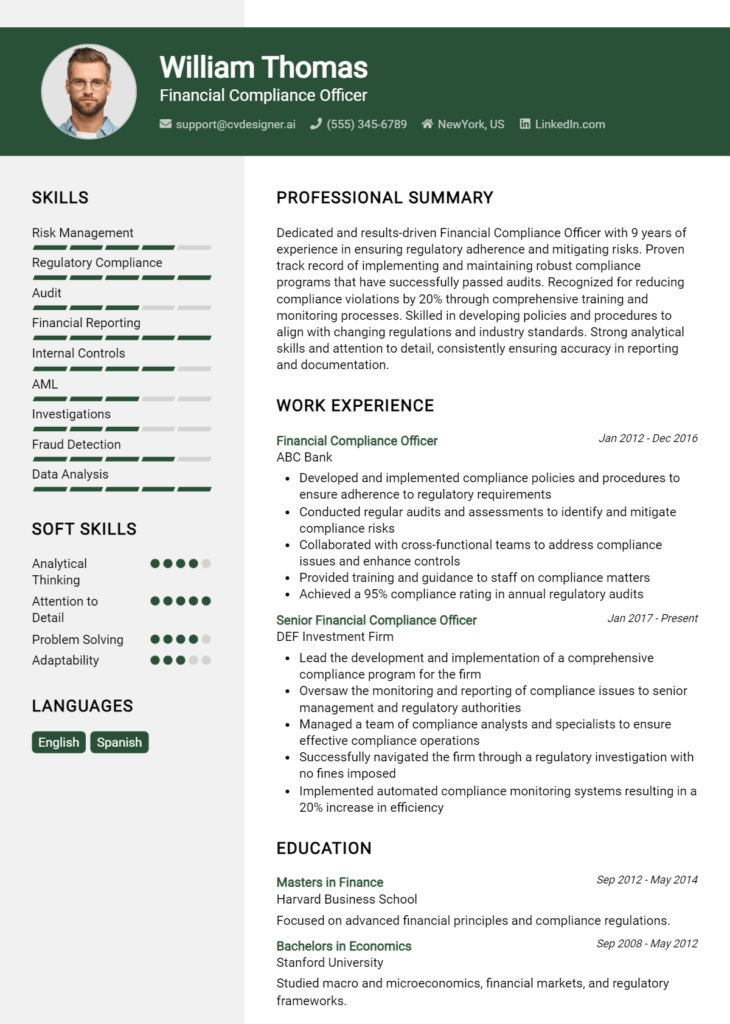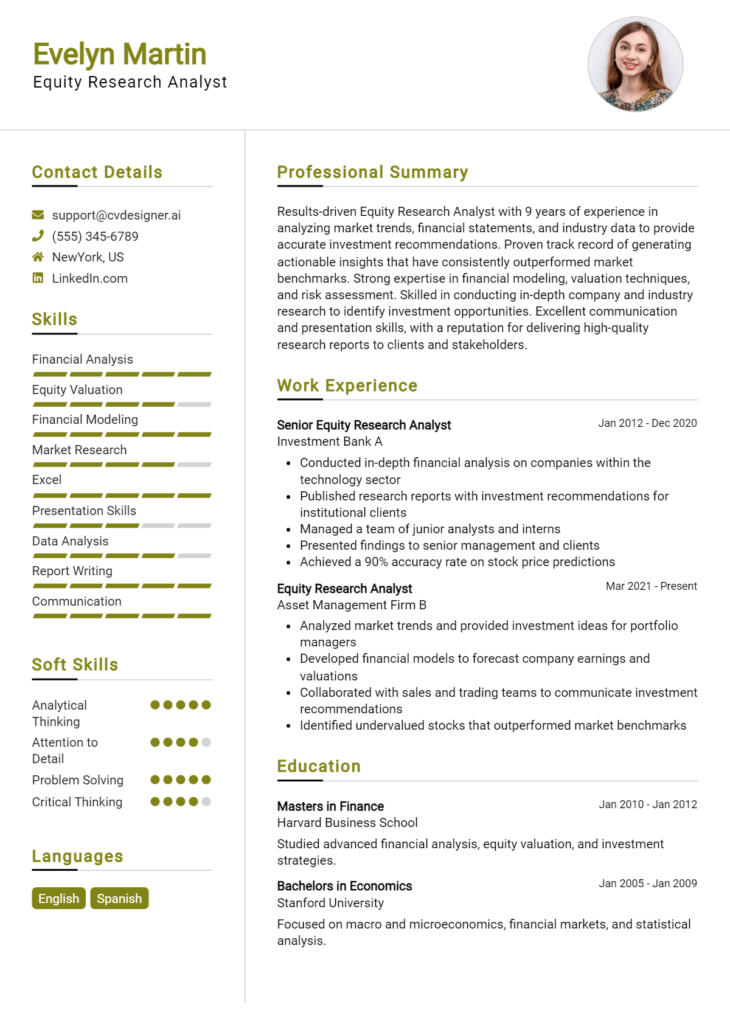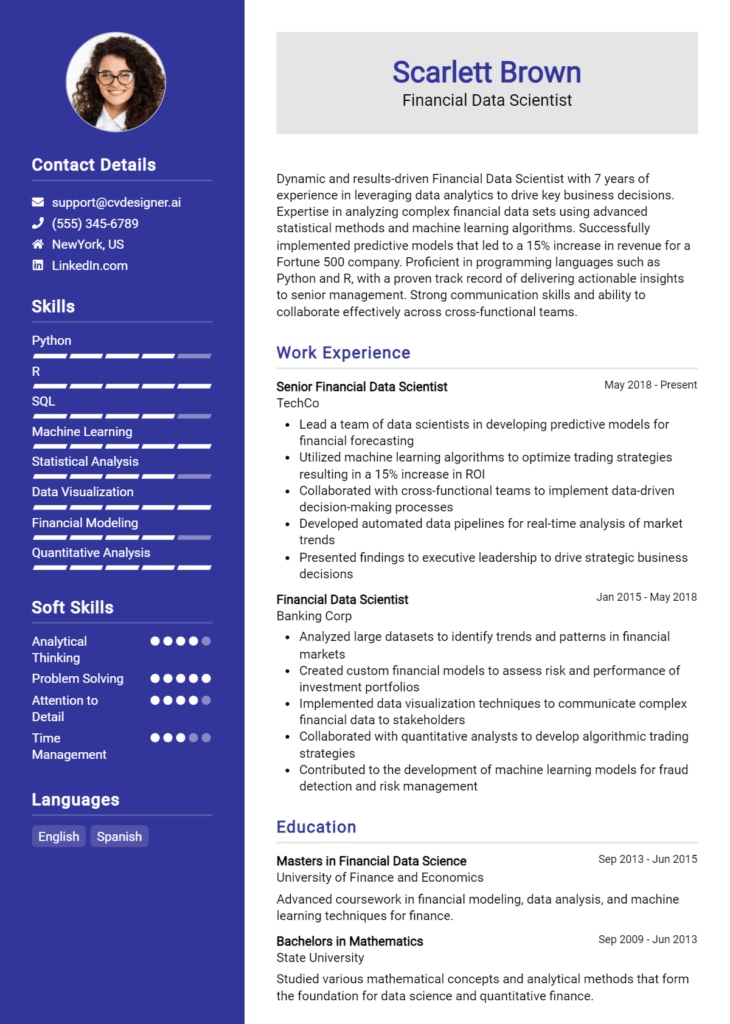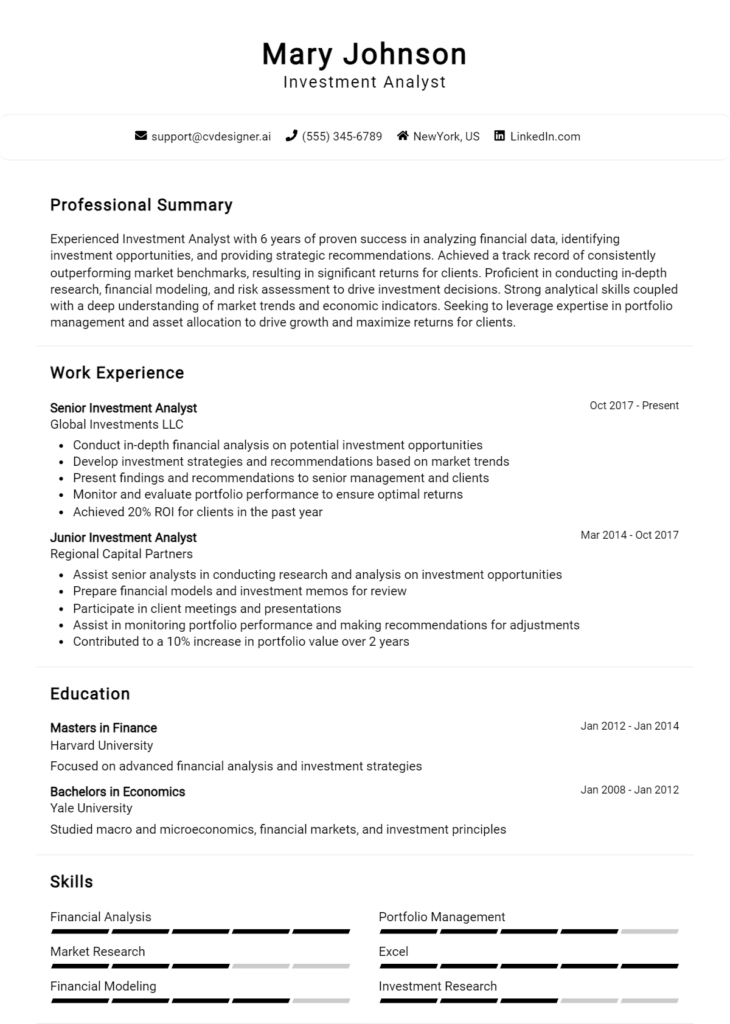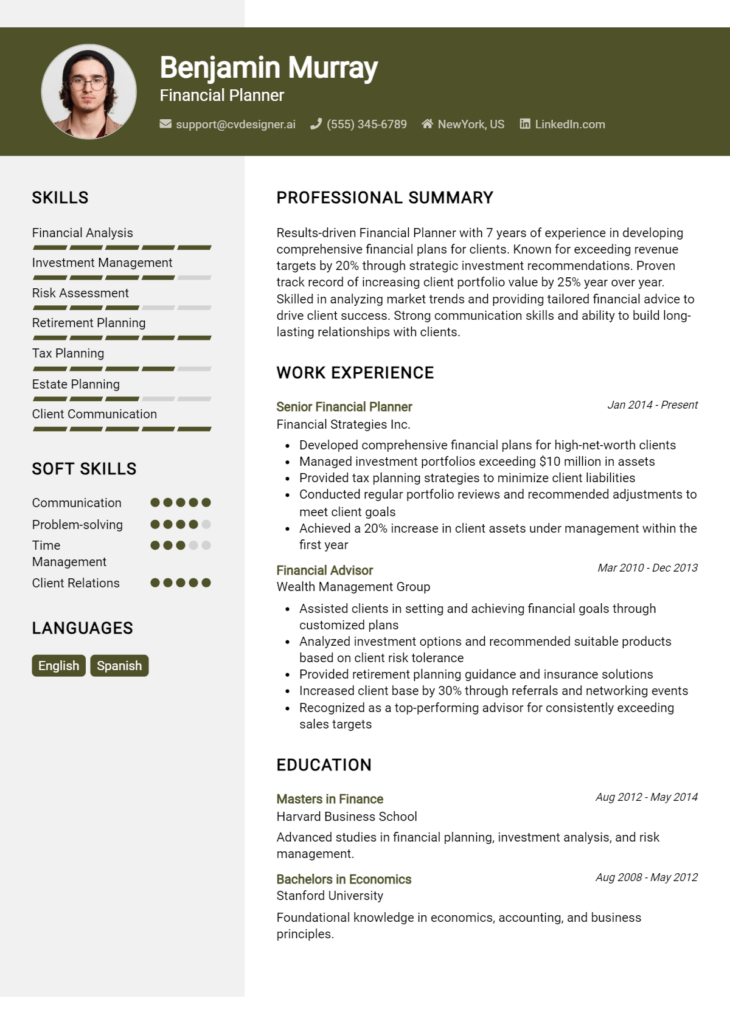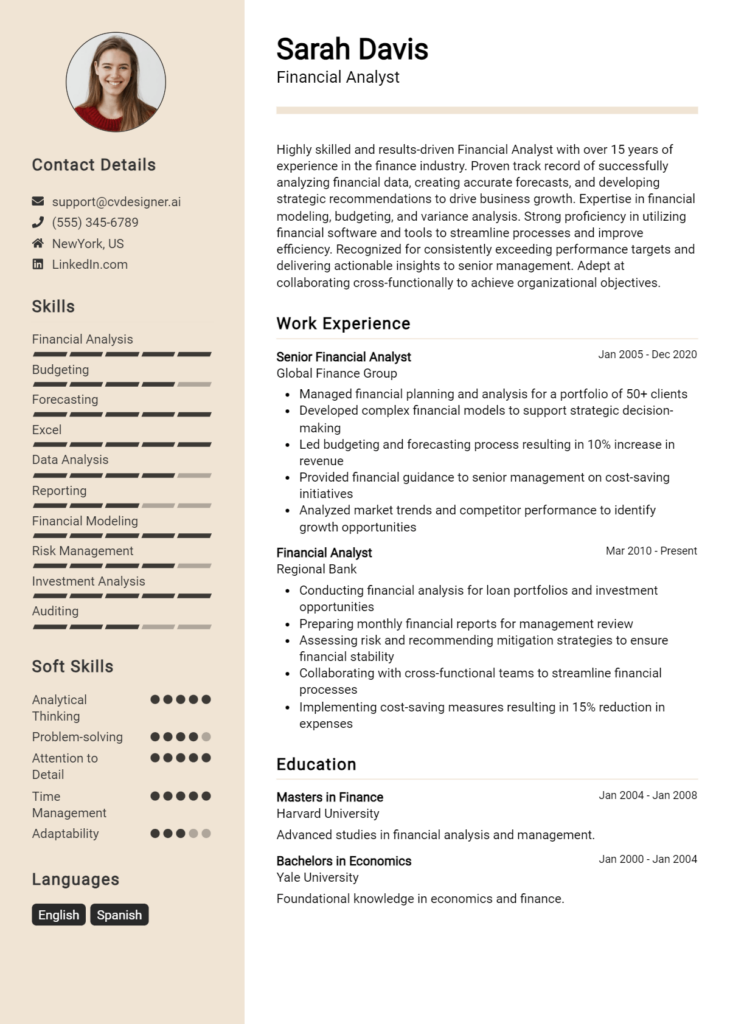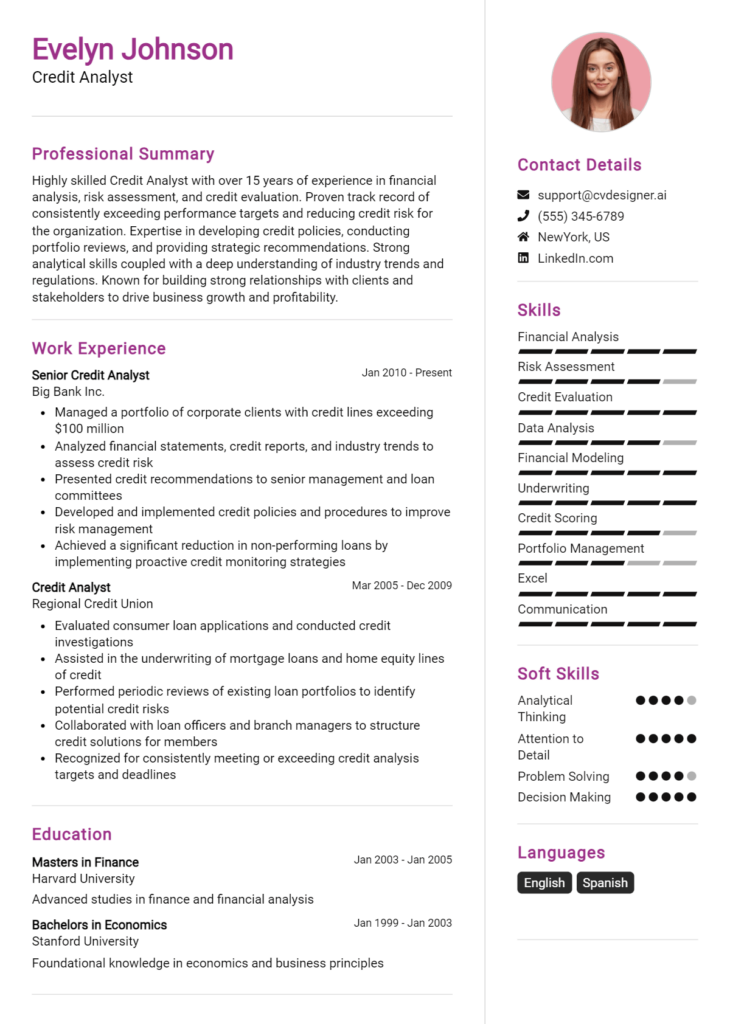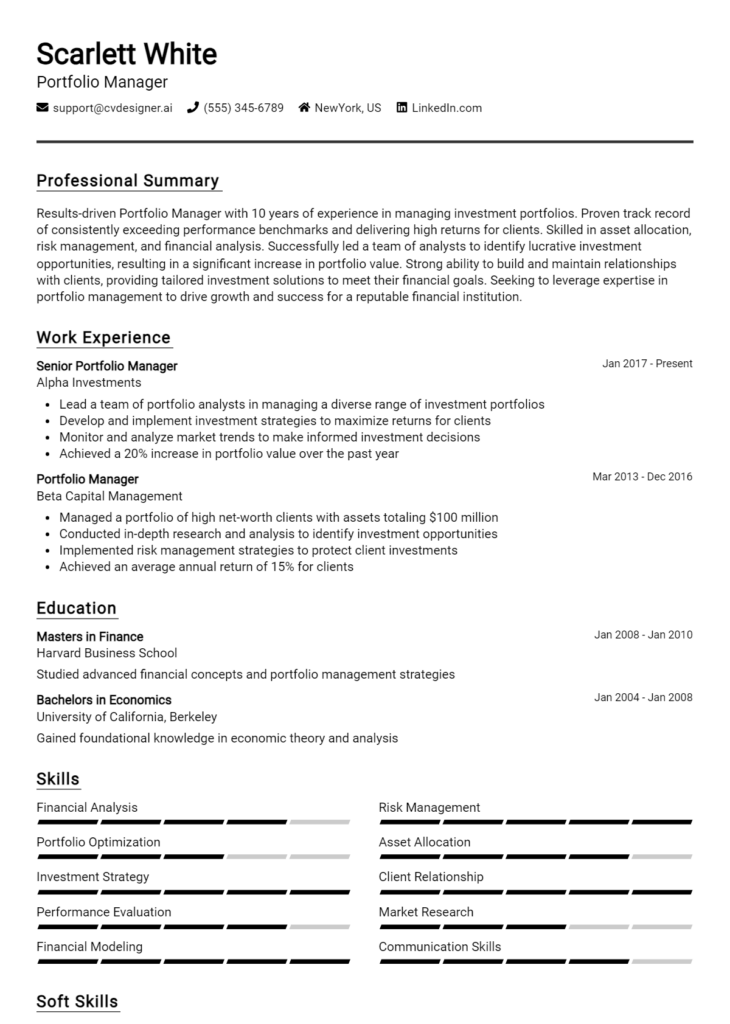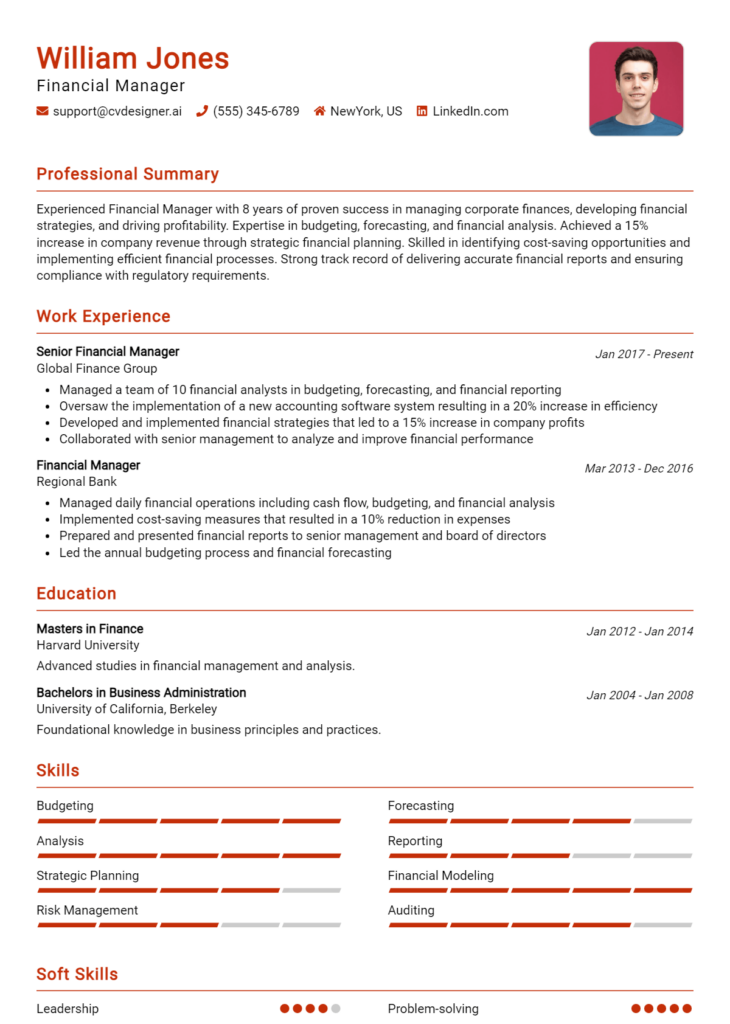Risk Analyst Core Responsibilities
A Risk Analyst plays a crucial role in identifying, assessing, and mitigating potential risks that could impede an organization’s objectives. This position demands strong technical skills, operational insight, and exceptional problem-solving abilities to navigate complex data and collaborate across various departments. By synthesizing information from finance, operations, and compliance, Risk Analysts ensure informed decision-making that aligns with the organization's strategic goals. A well-structured resume that highlights these competencies can effectively demonstrate a candidate's suitability for this vital role.
Common Responsibilities Listed on Risk Analyst Resume
- Conduct risk assessments to identify potential threats and vulnerabilities.
- Analyze data to evaluate risk exposure and impact on the organization.
- Collaborate with departments to develop risk mitigation strategies.
- Prepare detailed reports and presentations for stakeholders.
- Monitor regulatory changes and ensure compliance with industry standards.
- Implement risk management frameworks and policies.
- Assist in the development of business continuity plans.
- Utilize statistical and analytical tools to predict future risks.
- Provide training and support to staff on risk management practices.
- Review and refine existing risk management processes.
- Maintain up-to-date knowledge of market trends and risks.
High-Level Resume Tips for Risk Analyst Professionals
In the competitive field of risk analysis, a well-crafted resume is essential for making a lasting first impression on potential employers. Your resume serves as a marketing tool that showcases your skills, experiences, and achievements, providing a snapshot of your professional journey. For Risk Analyst professionals, it is crucial that this document not only highlights your analytical abilities and industry knowledge but also demonstrates a clear understanding of risk management principles. This guide will equip you with practical and actionable tips specifically tailored for crafting an outstanding resume that stands out in the eyes of hiring managers.
Top Resume Tips for Risk Analyst Professionals
- Tailor your resume to the job description by incorporating relevant keywords and phrases that match the specific requirements of the position.
- Highlight your relevant experience in risk analysis, including internships, projects, and previous roles that demonstrate your analytical skills.
- Quantify your achievements by using metrics to showcase the impact of your work, such as reduced risk exposure percentages or cost savings achieved through your analyses.
- Emphasize industry-specific skills, such as knowledge of risk assessment tools, regulatory compliance, and data analysis software.
- Include certifications relevant to risk analysis, such as the Financial Risk Manager (FRM) or Professional Risk Manager (PRM), to enhance your credibility.
- Utilize a professional format that is easy to read, ensuring that your resume is well-organized and visually appealing.
- Showcase your soft skills, such as communication and problem-solving, which are essential for effectively conveying risk insights to stakeholders.
- Incorporate a strong summary statement at the beginning of your resume that encapsulates your experience and what you bring to the role.
- Keep your resume concise, ideally one page, focusing on the most relevant information that aligns with the job you are applying for.
By implementing these tips, you can significantly enhance your chances of landing a job in the Risk Analyst field. A well-structured and targeted resume will not only attract the attention of hiring managers but also effectively communicate your qualifications, setting you apart from other candidates in the competitive job market.
Why Resume Headlines & Titles are Important for Risk Analyst
In the competitive landscape of risk management, a Risk Analyst's resume must stand out, and one of the most effective ways to achieve this is through impactful resume headlines and titles. A strong headline can immediately capture the attention of hiring managers, providing a succinct summary of a candidate's key qualifications and expertise in just a few words. By crafting a title that is concise, relevant, and directly related to the job being applied for, candidates can effectively highlight their unique value proposition, making it easier for recruiters to assess their suitability for the role at a glance.
Best Practices for Crafting Resume Headlines for Risk Analyst
- Keep it concise: Aim for a headline that is no longer than one or two lines.
- Be specific: Use industry-related keywords and phrases that align with the job description.
- Highlight key strengths: Focus on your most relevant skills and accomplishments.
- Tailor for each application: Customize your headline for the specific position you are applying for.
- Use action-oriented language: Choose dynamic verbs that convey a sense of initiative and impact.
- Incorporate quantifiable results: If possible, include metrics to demonstrate your achievements.
- Avoid jargon: Ensure clarity by using terms that are easily understood within the industry.
- Stay professional: Maintain a formal tone that reflects your expertise in risk analysis.
Example Resume Headlines for Risk Analyst
Strong Resume Headlines
Expert Risk Analyst with 5+ Years in Financial Risk Assessment and Mitigation
Data-Driven Risk Management Professional Specializing in Regulatory Compliance
Results-Oriented Risk Analyst with Proven Track Record in Fraud Detection
Dedicated Risk Analyst with Expertise in Quantitative Analysis and Portfolio Management
Weak Resume Headlines
Just a Risk Analyst
Experienced Professional Looking for Opportunities
Risk Analyst Seeking a New Job
The strong headlines are effective because they are specific, highlight relevant skills and experiences, and convey a sense of professionalism that resonates with hiring managers. They provide a clear snapshot of what the candidate can bring to the role, making it easier for recruiters to identify top talent quickly. In contrast, the weak headlines fail to impress due to their vagueness and lack of detail; they do not convey any unique value or expertise, leaving hiring managers without a compelling reason to consider the candidate further.
Writing an Exceptional Risk Analyst Resume Summary
A well-crafted resume summary is crucial for a Risk Analyst as it serves as the first impression to hiring managers. This brief yet impactful paragraph quickly captures attention by highlighting key skills, relevant experience, and notable accomplishments that align with the job role. A strong resume summary not only conveys the candidate's qualifications but also sets the tone for the rest of the resume. It should be concise, engaging, and tailored specifically to the position being applied for, ensuring that it resonates with the employer's needs and expectations.
Best Practices for Writing a Risk Analyst Resume Summary
- Quantify Achievements: Use specific numbers or percentages to highlight your accomplishments and impact.
- Focus on Relevant Skills: Emphasize skills that are directly applicable to the Risk Analyst role, such as data analysis, risk assessment, and regulatory knowledge.
- Tailor to the Job Description: Customize your summary to reflect keywords and requirements mentioned in the job posting.
- Be Concise: Keep your summary to 2-4 sentences, ensuring it is impactful without being overly verbose.
- Showcase Industry Knowledge: Highlight familiarity with industry-specific regulations, tools, or methodologies relevant to risk management.
- Include Soft Skills: Mention essential soft skills like problem-solving, communication, and analytical thinking that support your technical abilities.
- Use Active Language: Write in an active voice to convey confidence and proactivity in your experience and skills.
- Review and Edit: Ensure clarity and professionalism by proofreading your summary for errors and coherence.
Example Risk Analyst Resume Summaries
Strong Resume Summaries
Results-driven Risk Analyst with over 5 years of experience in financial services, successfully reducing operational risk by 30% through the implementation of comprehensive risk assessment frameworks and data analytics tools.
Detail-oriented Risk Analyst skilled in quantitative analysis and risk modeling, having identified potential financial losses exceeding $2 million and recommending strategies that led to a 25% reduction in risk exposure within two years.
Proactive Risk Analyst with expertise in regulatory compliance and risk management, recognized for leading cross-functional teams to develop risk mitigation strategies that decreased incidents by 40% while maintaining compliance with industry standards.
Weak Resume Summaries
Experienced analyst looking for a position in risk management.
I have skills in data analysis and want to help companies with risk.
The examples of strong resume summaries demonstrate a clear alignment with the Risk Analyst role by showcasing quantifiable achievements, specific skills, and relevant experience. They convey the candidate's value and capability in a precise manner. In contrast, the weak summaries lack detail and specificity, making them ineffective at capturing the hiring manager's interest or conveying the candidate's qualifications. These vague statements fail to illustrate the candidate's potential contributions to the organization, making them less compelling overall.
Work Experience Section for Risk Analyst Resume
The work experience section of a Risk Analyst resume is critical as it provides a comprehensive overview of the candidate's practical skills and expertise in the field. This section not only highlights the candidate's technical knowledge in risk assessment and management but also showcases their ability to lead teams and deliver high-quality products in challenging environments. By quantifying achievements and aligning work history with industry standards, candidates can effectively demonstrate their value to potential employers, making this section a key component in securing a position in risk analysis.
Best Practices for Risk Analyst Work Experience
- Clearly articulate your technical skills related to risk analysis tools and methodologies.
- Quantify your achievements using metrics such as percentage improvements, cost savings, or risk reduction figures.
- Highlight experience with regulatory compliance and risk management frameworks relevant to the industry.
- Emphasize collaboration and teamwork by mentioning cross-functional projects and leadership roles.
- Use action verbs to convey your contributions and the impact of your work.
- Tailor your work experience to align with the specific requirements of the job description.
- Incorporate industry standards and terminology to demonstrate familiarity with the field.
- Include any certifications or relevant training that enhance your credentials as a risk analyst.
Example Work Experiences for Risk Analyst
Strong Experiences
- Led a team of 5 analysts in a comprehensive risk assessment project that resulted in a 30% reduction in overall operational risks within 12 months.
- Implemented a new risk management software that improved data analysis speed by 40%, enabling timely decision-making for stakeholders.
- Collaborated with cross-functional teams to develop a risk mitigation strategy, reducing projected losses by $500,000 annually.
- Conducted training sessions for junior analysts, enhancing their technical proficiency and contributing to a 25% increase in team productivity.
Weak Experiences
- Worked on various projects related to risk analysis.
- Assisted in the preparation of reports and other documentation.
- Participated in team meetings to discuss risk issues.
- Helped to improve processes in the department.
The examples classified as strong demonstrate clear, quantifiable outcomes, leadership in technical projects, and collaborative efforts that led to significant results. In contrast, the weak examples are vague, lacking specific achievements or measurable impacts, which diminishes their effectiveness in showcasing the candidate's capabilities and contributions in the role of a risk analyst.
Certifications and Education for a Risk Analyst Resume
When crafting a resume for a Risk Analyst position, it’s essential to highlight both your educational background and relevant certifications. These elements not only demonstrate your qualifications but also show your commitment to the field of risk management. Here are some guidelines on how to effectively list your certifications and education:
Certifications to Prioritize:
Certified Risk Management Professional (CRMP): This certification is highly regarded in the field of risk management and demonstrates a comprehensive understanding of risk principles and practices.
Financial Risk Manager (FRM): Offered by the Global Association of Risk Professionals (GARP), the FRM certification is recognized globally and focuses on risk analysis and management in the financial sector.
Professional Risk Manager (PRM): This certification, provided by the Professional Risk Managers' International Association (PRMIA), covers a wide range of risk management topics and is beneficial for those working in various sectors.
ISO 31000 Risk Management Certification: This certification focuses on the international standard for risk management, equipping you with frameworks and principles to effectively manage risk.
Certificate in Quantitative Finance (CQF): While more technical, this certification can be an asset for Risk Analysts involved in quantitative risk assessment and financial modeling.
Educational Background Examples:
Bachelor’s Degree in Finance: A solid foundation in finance equips you with the necessary skills to understand financial risks and instruments.
Bachelor’s Degree in Business Administration: This degree often includes courses on risk management, decision-making, and strategic planning, which are vital for a Risk Analyst role.
Master’s Degree in Risk Management: Pursuing a master’s degree specifically in risk management can provide advanced knowledge and specialized skills in the field.
Master’s Degree in Financial Engineering: This program combines finance, mathematics, and computer science, preparing you for the quantitative aspects of risk analysis.
When listing your certifications and educational qualifications, use a clean and organized format. Place your most relevant certifications toward the top of the section to catch the hiring manager's attention. For example:
Certifications:
- Certified Risk Management Professional (CRMP)
- Financial Risk Manager (FRM)
- ISO 31000 Risk Management Certification
Education:
- Bachelor’s Degree in Finance, University Name, Graduation Year
- Master’s Degree in Risk Management, University Name, Graduation Year
By strategically showcasing your certifications and educational qualifications, you can make a compelling case for your candidacy as a Risk Analyst.
Top Skills & Keywords for Risk Analyst Resume
In today's dynamic financial landscape, the role of a Risk Analyst has become increasingly crucial for organizations aiming to navigate uncertainties and safeguard their assets. A well-crafted resume that highlights the right skills can significantly enhance a candidate's appeal to potential employers. By effectively showcasing both hard and soft skills, candidates can demonstrate their analytical abilities, attention to detail, and capacity for strategic thinking. This blend of skills not only showcases a candidate's qualifications but also their readiness to tackle the complex challenges that arise in risk management. Understanding the key skills that are sought after in this field is essential for crafting a compelling resume that stands out.
Top Hard & Soft Skills for Risk Analyst
Soft Skills
- Analytical Thinking
- Problem-Solving
- Attention to Detail
- Communication Skills
- Team Collaboration
- Time Management
- Adaptability
- Critical Thinking
- Decision-Making
- Interpersonal Skills
Hard Skills
- Risk Assessment Techniques
- Financial Modeling
- Data Analysis Tools (e.g., Excel, R, Python)
- Regulatory Compliance Knowledge
- Statistical Analysis
- Quantitative Risk Management
- Risk Management Software (e.g., SAS, MATLAB)
- Business Continuity Planning
- Report Generation
- Knowledge of Financial Instruments
For more insights into how to effectively present your skills and work experience on your resume, consider exploring additional resources that can help you tailor your application to the needs of potential employers.
Stand Out with a Winning Risk Analyst Cover Letter
Dear [Hiring Manager's Name],
I am writing to express my interest in the Risk Analyst position at [Company Name] as advertised on [Job Board/Company Website]. With a strong background in financial analysis and risk management, coupled with my proficiency in statistical modeling and data analysis tools, I am confident in my ability to contribute effectively to your team. My experience in identifying, assessing, and mitigating risks aligns perfectly with [Company Name]'s commitment to maintaining a robust risk management framework.
In my previous role at [Previous Company], I successfully conducted comprehensive risk assessments that led to a 20% reduction in operational risks over two years. By leveraging advanced analytical techniques and developing risk mitigation strategies, I was able to provide actionable insights that informed executive decision-making. My proficiency in using software tools such as SAS, R, and Excel has allowed me to analyze complex datasets and present findings in a clear and concise manner. I believe that my analytical skills, combined with my attention to detail, make me a strong candidate for this position.
I am particularly drawn to [Company Name] because of its innovative approach to risk management and its commitment to fostering a culture of continuous improvement. I am excited about the opportunity to collaborate with your team to enhance risk assessment processes and develop strategies that protect the organization's assets and reputation. I am eager to bring my expertise in quantitative analysis and my proactive approach to problem-solving to [Company Name], helping to navigate the complexities of today's financial landscape.
Thank you for considering my application. I look forward to the opportunity to discuss how my skills and experiences align with the goals of [Company Name]. I am enthusiastic about the possibility of contributing to your esteemed organization and am available for an interview at your earliest convenience.
Sincerely,
[Your Name]
[Your Contact Information]
[Your LinkedIn Profile]
Common Mistakes to Avoid in a Risk Analyst Resume
When crafting a resume for a Risk Analyst position, it's crucial to present a well-structured and targeted document that highlights your skills and experiences effectively. However, many candidates make common mistakes that can hinder their chances of landing an interview. Recognizing these pitfalls can enhance the quality of your resume and make you a more competitive applicant in the field of risk analysis.
Generic Objective Statements: Using a one-size-fits-all objective can come off as impersonal. Tailor your objective to reflect your specific goals related to the risk analyst role you are applying for.
Lack of Quantifiable Achievements: Simply listing job responsibilities without quantifying your achievements can weaken your resume. Use metrics and specific examples to demonstrate your impact, such as percentage reductions in risk or improvements in compliance.
Ignoring Keywords from the Job Description: Failing to include relevant keywords from the job posting may cause your resume to be overlooked by applicant tracking systems (ATS). Carefully review the job description and integrate essential terms and skills.
Overly Technical Jargon: While technical skills are important, using excessive jargon can alienate recruiters who may not be experts in your field. Aim for clear and concise language that conveys your expertise while remaining accessible.
Inconsistent Formatting: A disorganized or inconsistent format can make it difficult for hiring managers to read your resume. Use a clean, professional layout with consistent font sizes, bullet points, and spacing for a polished appearance.
Omitting Soft Skills: Risk analysis requires a combination of technical and soft skills. Failing to highlight your abilities in communication, problem-solving, and teamwork can leave out critical components of your candidacy.
Neglecting Professional Development: Not including recent certifications or training relevant to risk management can signal a lack of commitment to continuous learning. Highlight any relevant courses or certifications to demonstrate your dedication to the field.
Too Much Focus on Education: While education is important, overemphasizing it at the expense of practical experience can be a mistake. Ensure that your work experience is prominently featured and showcases your relevant skills in action.
Conclusion
As we explored in this article, the role of a Risk Analyst is critical in identifying, assessing, and mitigating potential risks that could impact an organization's operations and profitability. Key competencies for this position include analytical thinking, attention to detail, and a strong understanding of financial principles and risk management methodologies. Additionally, effective communication skills are essential for conveying complex risk scenarios to stakeholders in a clear and concise manner.
To stand out in this competitive field, it’s vital to have a polished and professional resume that highlights your relevant experience and skills. As you prepare to advance your career as a Risk Analyst, take a moment to review your resume. Ensure it reflects your expertise, achievements, and the specific requirements of the positions you are targeting.
To assist you in this process, consider utilizing various resources available to enhance your resume and application materials. You can find tailored resume templates that align with industry standards, a user-friendly resume builder to create a customized layout, and cover letter templates that effectively showcase your qualifications.
Don’t miss the opportunity to make a strong impression in your job search. Start reviewing and updating your Risk Analyst resume today!

